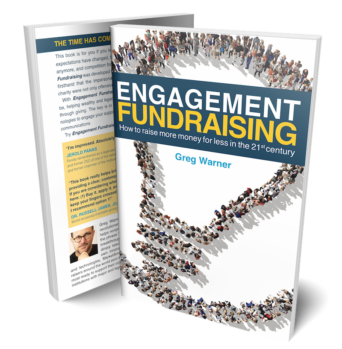We use cookies to ensure that we give you the best experience on our website. By continuing to use this site, you agree to our use of cookies in accordance with our Privacy Policy.
 Login
Login
Your Role
Challenges You Face
results
Learn
Resources
Company
4 Ways Your Assumptions about Major Donors Are Hurting Your Fundraising


You know that feeling when you’re talking to someone, and you realize they’ve already made up their mind about you? It happens in dating, in political discussions, at work, and in many other contexts. And it’s annoying. Worse than that, it also puts up a wall between you and the other person.
Well guess what? When you make assumptions about your major donors and prospects, the damage is even more severe.
Why?
Because the stakes of your relationships with major donors are very high. Major donors contribute over 80% of funding to most nonprofits. The percentages are increasing nationwide. I’ve referred to this phenomenon many times as ‘fundraising climate change’, and it is a centerpiece of my special report on how you need to adapt to the huge shifts happening in the fundraising world.
So if your donor assumptions build up walls between you and your major donors, you’re going to be limiting or boxing out the biggest sources of your funding.
What Are Some Common Major Donor Assumptions?
Fundraising consultant Kevin Fitzpatrick commented about this in a LinkedIn post when he declared that “all major gifts fundraisers like pineapple pizza.” Using humor, his goal was to draw attention to equally incorrect assumptions fundraisers make about major donors.
Even at fundraising conferences, from speakers who are supposedly experts, you will hear assumptions about major donors that just aren’t true for most of them.
A few examples:
- Major donors only give to capital campaigns
- Major donors always prefer restricted gifts
- Major donors flaunt their wealth
- Major donors are greedy and don’t care who gets hurt in their pursuit of profit and wealth
- Major donors want to be publicly recognized for their gifts
- Most wealthy people inherit their wealth
These sorts of assumptions are pervasive. Modern media and entertainment haven’t helped, because pretty much every portrayal of wealthy people in films and TV shows presents them in some version of this caricature.
One commenter on Fitzpatrick’s post even said he heard at an industry conference that “major donors are all evil, rabid capitalists that eat small children and destroy communities,” and that they only give because they feel guilty about it.
Again – he heard this at a nonprofit industry conference.
And while he’s probably embellishing just a bit in the specifics, the fact that someone high up in fundraising would express beliefs about donors that left him with this impression speaks volumes about that person’s assumptions about major donors and wealthy prospects.
This stuff is caustic.
You cannot be a good fundraiser if this is how you think about your major donors. You can’t make good relationships with people you inwardly despise or envy… and let’s get real – this is mostly about envy. Or is that my own wrong assumption?
4 Ways Major Donor Assumptions Will Imperil Your Fundraising
So let’s briefly look at why making assumptions like these about major donors will bring so much damage to your organization and your mission.
1. Assumptions Make This About You and Not Them
Here’s the problem – even if you’re right about an assumption with a particular donor, so what? This isn’t about you. The donor is still the one giving. If you want to partner with them, you have to enter into their world. What they care about. What they value. What’s important to them.
Major donors give for all sorts of reasons, and your job is to help optimize their giving experience, not inject your personal feelings or prejudices into the relationship.
When you make this more about you, the donor will feel it. And they will withdraw.
Dan Magill, a fundraising copywriter, once heard the leader of a well-known fundraising professionals organization say in a seminar that nonprofits should not work with major donors if those donors won’t align with the organization’s worldview and values – even if they differ from the donor’s values – and that they need to “train” their donors.
No, that’s not going to hurt your fundraising at all…
2. Wrong Assumptions Strain Relationships
We mentioned this before, but it bears repeating. A strained relationship makes it harder to give happily and generously.
Here’s a hypothetical scenario:
A donor gets contacted by a gift officer. The gift officer lands a meeting with them, and they have a long conversation. And in the meeting, the gift officer spends lots of time convincing the donor why unrestricted gifts are better than restricted ones, and that the organization has more needs than just the capital campaign they’ve been discussing.
Now, what if this donor always wanted to give to the general fund, and didn’t even know what a restricted gift was?
When you’re in a conversation like this as a donor, you feel kind of dumb. You can tell there is something you don’t know that the other person does know, and you feel lectured.
In this scenario, the donor might still give. But they won’t feel as good about it. They’ll feel like they were led to make a particular decision, and that the gift officer had an agenda.
The result – the long term relationship is strained, and future gifts are less likely. And, the gift certainly will not be as large as it could have been.
3. Assumptions Reveal a Lack of Curiosity or Interest
When people make assumptions, it shows they don’t really want to understand the other person’s point of view. They’ve already made up their mind.
But a healthy and productive relationship cannot exist if one person thinks and acts this way. Relationships are a two-way street. Both people have to have some interest in the other person.
Have you ever known someone who always talks about themselves, their lives, their experiences, their worries, their opinions? You ask them questions, and they love it, and keep talking. But then, they never ever ask you anything. They show no interest whatsoever in you.
It won’t take long before you start avoiding them.
Gift officers must have sincere and genuine interest in their supporters. A great conversation, even if no gift is made or pledged, will still feel like a win. And it IS a win, because it means you’ll be able to have another conversation later.
4. Assumptions Deny the Many Reasons Why Major Donors Give
Donors give for all sorts of reasons, and you can’t assume which ones are motivating the supporter you’re meeting with on a particular day.
Some donors give for spiritual or religious reasons. Others give because it’s part of their family history. Others give because they had a profound life experience and are turning their lives in a new direction.
There are tons of reasons why donors give.
When you ignore this, and just presume the donor is giving out of guilt, or greed, or personal recognition, or some other assumption that says more about you than it does about them, you are making it harder for the donor to connect with you and trust you.
Without trust, you will not win the biggest transformational gifts. That’s just not how people behave.
How Well Do You Know Your Donors?
One donor assumption listed earlier was that wealthy people all inherit their wealth. With that, we then picture the media-fueled caricature of the entitled, self-absorbed, heartless rich kid that everyone loves to hate.
Here’s the problem:
A study found that only 7.4% of wealthy people inherited their wealth, and 72.5% of them earned it themselves. Furthermore, the study explored the values of these first generation wealthy people, and a few themes emerged.
Newly wealthy families tend to value modesty. They don’t like to flaunt their wealth. They value agency, meaning they want to use their money to influence the world. They value the freedom their money provides them and their families.
Newly wealthy families have found, to their dismay, that their wealth has made it harder to keep up friendships with people who knew them before they had wealth. So they have experienced relational loss.
Read this article for more about the values of first-generation wealthy families, and how to better understand them.
But remember – even though that study has some good data behind it – you can’t make assumptions that the person you’re talking to shares any of those values or experiences.
Every person is different. Every person’s life experience is unique. And you must have the curiosity, sincere interest, open mind, and humility to engage with your supporters and prospects as individuals, not as caricatures.
Related Resources:
- How to Help Your Wealthiest Supporters Solicit Themselves
- 4 Primal Motives for Major Gifts – the REAL Reasons People Make Transformational Gifts
- The Two Most Important Words in Philanthropic Facilitation: “Because You”
- 10 Questions You Should Ask Your Wealthy Supporters to Motivate them to Give
LIKE THIS BLOG POST? SHARE IT AND/OR LEAVE YOUR COMMENTS BELOW!
Get smarter with the SmartIdeas blog
Subscribe to our blog today and get actionable fundraising ideas delivered straight to your inbox!

I think your first point needs to have an asterisk by it. If the donor is outright against your values e.g racist comments etc, I wouldn’t want to cultivate them to bring them into the organization just because they are part of the 80%. It’s not all about the $$ its about fueling a mission with integrity, because $$ will only go so far you can’t buy trust.
Good point, Lisa.